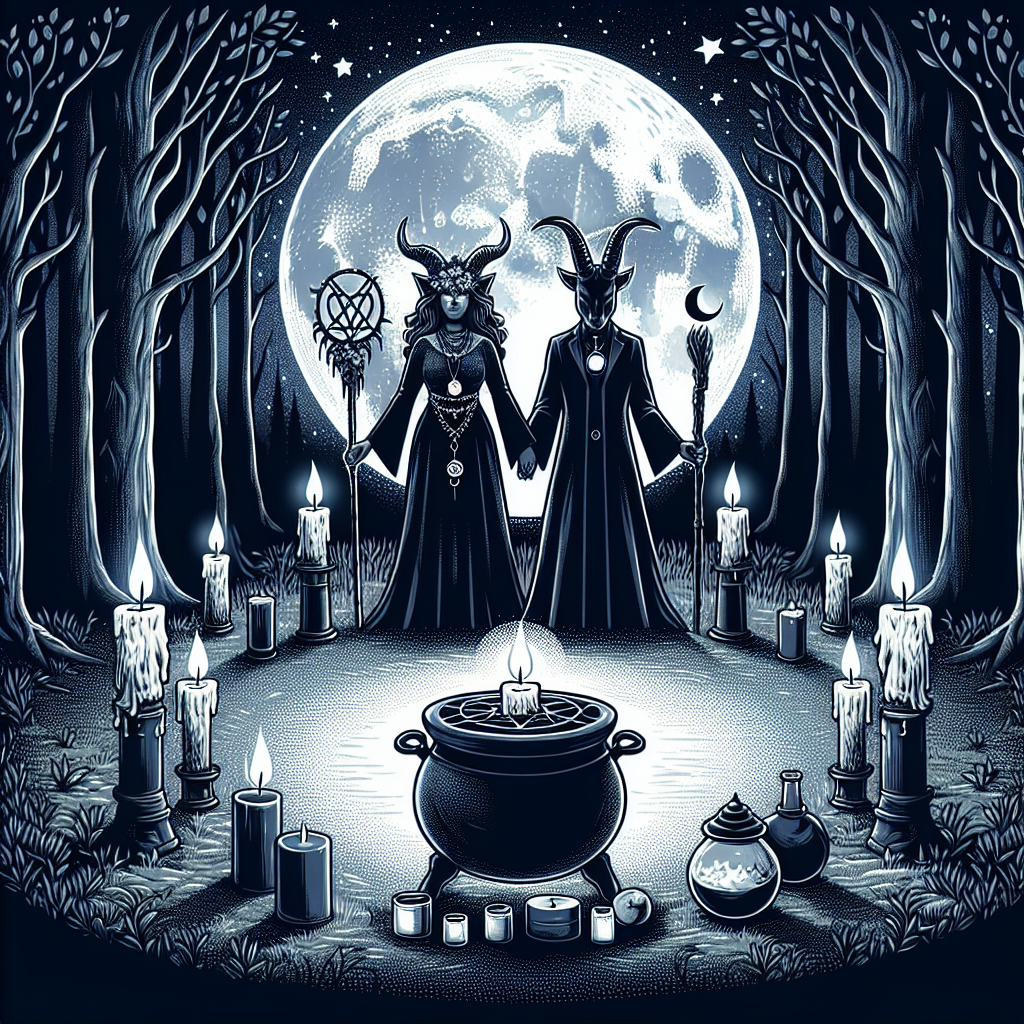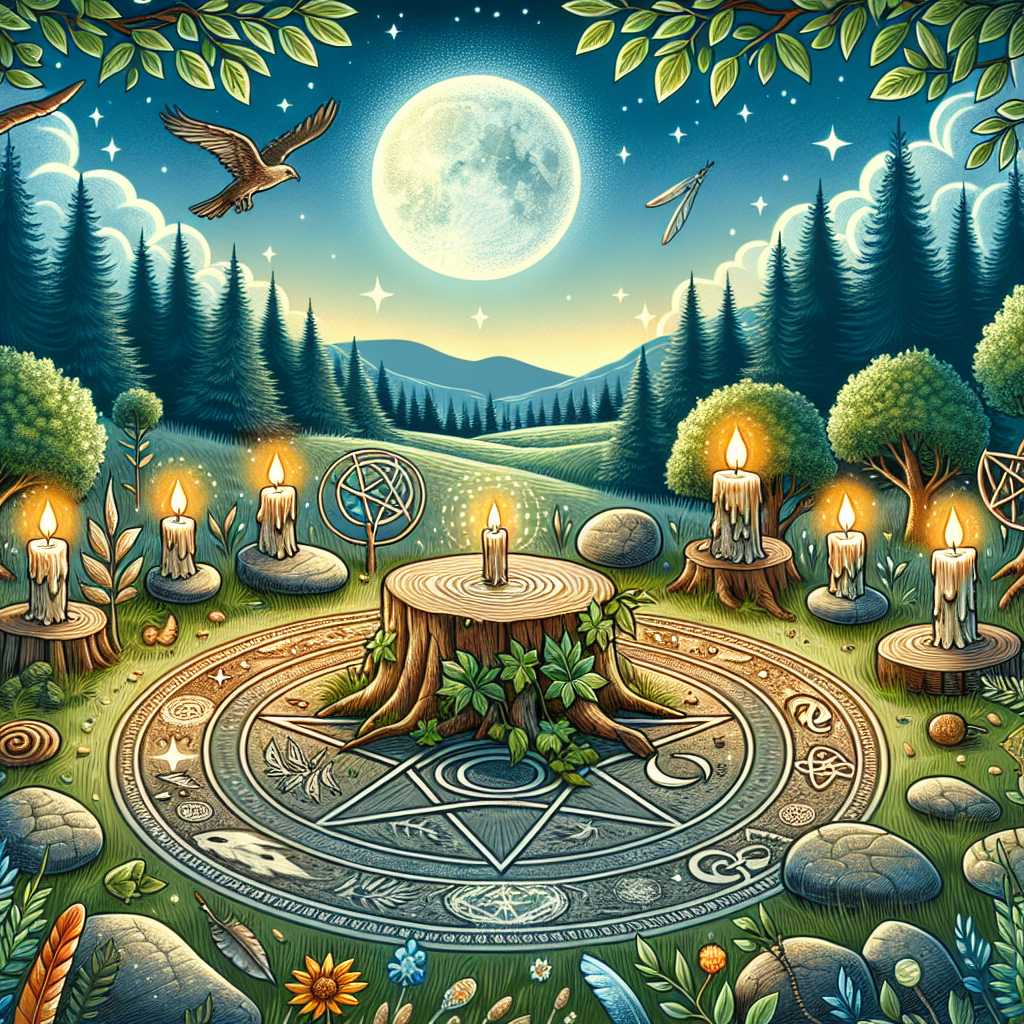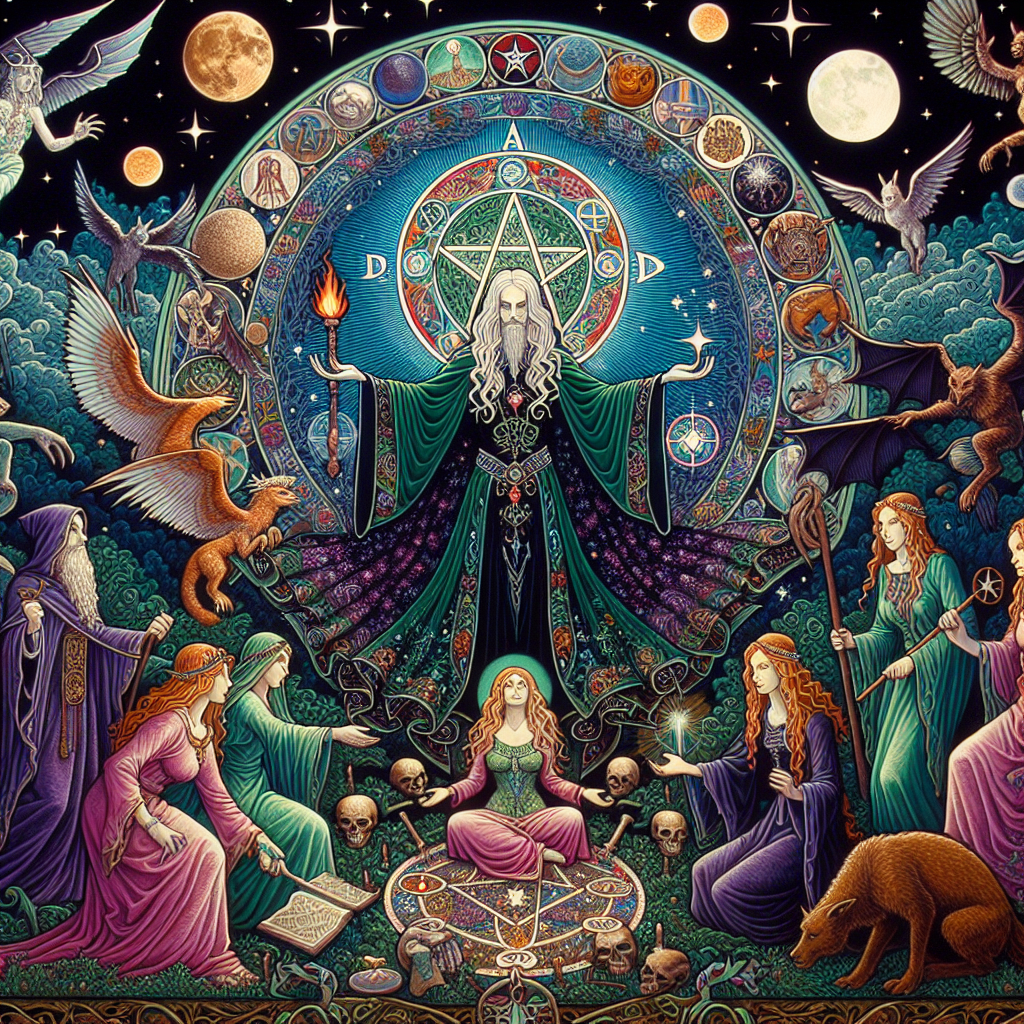As an Amazon Associate I earn from qualifying purchases.

Wicca, a modern pagan religion that emerged in the mid-20th century, draws upon a diverse set of ancient pagan beliefs and practices. At its core, Wicca worships the duality of the Divine, epitomized by the Goddess and the God, which are represented in various forms and names in different Wiccan traditions. These deities are often depicted as embodying complementary polarities, such as the moon and the sun, the earth and the sky, or the feminine and the masculine.
The religion’s origins can be traced back to the early 1950s in England with the works of Gerald Gardner, who is often credited with founding modern Wicca. He introduced the idea of the Mother Goddess and the Horned God as central deities. Wiccans regard these deities not as distant, omnipotent beings, but rather as symbols and archetypes that are immanent in nature. This allows practitioners to connect with them on a personal and intimate level. Over the years, Wicca has grown and evolved, with practitioners now around the globe, contributing to the rich tapestry of contemporary Pagan worship.
A salient characteristic of Wicca is its flexibility and inclusivity when it comes to deities. Some Wiccans are polytheistic, honoring a pantheon of gods and goddesses from various mythologies, such as Celtic, Norse, Greek, or Egyptian. Others might focus on a specific deity, while some might view these figures as aspects of a singular, universal spirit. This multifaceted approach allows individuals to connect with the divine in a manner that aligns with their personal beliefs and experiences.
Interestingly, a significant number of Wiccans identify as solitaries—practitioners who operate alone rather than as part of a coven. According to a survey by the Pew Research Center, solitary practitioners make up a large proportion of those who identify as Wiccan or Pagan. This individualistic approach to worship means that the deities and beliefs within Wicca are often personally tailored to each practitioner, with respect for each person’s unique interpretation and relationship with the divine.
“`html
Understanding Wiccan Deities: Who Are the Gods and Goddesses of Wicca?
“`
Wicca is a modern, nature-based pagan religion that honors a variety of deities. Practitioners of Wicca worship a duotheistic framework of a Goddess and a God, who are seen as equal, complementary forces. These deities embody various aspects of the natural world and spiritual realms. Some Wiccans may also pay homage to a pantheon of gods and goddesses from different mythologies, such as Celtic, Norse, or Roman, reflecting the eclectic and personal approach of the faith. In this article, we delve into the fascinating array of divine figures celebrated within Wicca, exploring their significance and the beliefs that surround them. Join us as we uncover the rich tapestry of worship in the Wiccan tradition.
Wicca, a modern Pagan religion that arose in the early 20th century, bases its worship on a diverse pantheon of deities taken from various pagan traditions throughout history. Central to Wiccan worship is the veneration of the Goddess and the God, who are seen as equal and opposite divine forces that balance and complement each other. This duotheistic framework acknowledges the Goddess as the Mother of all living things and the embodiment of femininity, fertility, and the earth, while the God is often seen as the embodiment of masculinity, wilderness, and the Sun.
The Goddess is frequently represented in three aspects: the Maiden, the Mother, and the Crone, symbolizing the stages of a woman’s life and the phases of the moon. Each aspect has different characteristics and attributes associated with it. For example, the Maiden represents youth, new beginnings, and the waxing moon, the Mother corresponds to nurturing, strength, and full moon, and the Crone is linked to wisdom, endings, and the waning moon.
The God, on the other hand, is often depicted as the Horned God of the hunt, associated with animals and the life cycle of plants and animals. He represents the spirit of the forests, the wild, and male energy. He is celebrated during seasonal festivals and is believed to be born at Yule (the winter solstice), grow to power at Beltane, sacrifice himself on Lughnasadh for the land’s fertility, and die at Samhain to be reborn again at Yule.
Beyond the overarching worship of the Goddess and the God, many Wiccans also recognize a wide variety of other deities, including those drawn from the Roman, Greek, Egyptian, Celtic, and Norse pantheons, among others. Some Wiccans may also choose to focus worship on a particular deity or pantheon that resonates with them personally. This flexible approach allows adherents to tailor their worship to personal beliefs and experiences, reflecting the syncretic nature of Wiccan spiritual practice.
The beliefs in Wicca revolve around the cycles of nature and the Wheel of the Year, which is composed of eight sabbats or seasonal festivals. These sabbats celebrate the eternal interplay between the Goddess and the God, as well as the cycle of birth, growth, death, and rebirth. These include the four solar festivals—Yule, Ostara, Litha, and Mabon—and the four agricultural festivals—Imbolc, Beltane, Lughnasadh, and Samhain. Furthermore, esbats are monthly full moon celebrations during which Wiccans honor the lunar aspects of the Goddess.
Wiccan rituals can be either elaborate or simple and are often conducted within a sacred circle. Practices may include casting spells, chanting, meditation, and performing rituals which align with the energies of the natural world. The ethical framework of Wicca is encapsulated in the Wiccan Rede, which is summarized by the phrase “An it harm none, do what ye will.” Wiccans also believe in the Threefold Law, which postulates that the energy a person puts into the world—good or bad—will be returned three times.
Statistically, it’s challenging to determine the exact number of individuals who practice Wicca due to its diverse nature and the private practice of many adherents. However, estimates suggest that there are hundreds of thousands, possibly millions, of people who follow Wicca or Wicca-influenced spiritual paths worldwide. According to the Pew Research Center, Wicca, along with other Pagan religions, has been growing in the United States, with an estimated 1.5 million people identifying as Pagan or Wiccan in 2014.
“`html
1. What is Wicca, and is it the same as witchcraft?
Wicca is a modern, nature-based pagan religion that incorporates certain practices such as ritual magic. While it involves aspects commonly associated with witchcraft, it is a distinct religion with its own set of beliefs, deities, and practices. Witchcraft, on the other hand, is a broader term that can refer to various magical practices across different cultures and religions, not necessarily connected to Wicca.
2. Who are the primary deities worshipped in Wicca?
In Wicca, the primary deities worshipped are the Goddess and the God, which represent the female and male aspects of the divine. The Goddess is often associated with the earth and the moon, while the God is associated with nature and the sun. They are sometimes depicted as the Triple Goddess and the Horned God.
3. Do all Wiccans worship the same deities?
No, not all Wiccans worship the same deities. While many Wiccans honor the Goddess and the God, others may also venerate a pantheon of deities from various cultures, such as Norse, Egyptian, Greek, or Roman traditions. Wicca is flexible, allowing practitioners to connect with deities that resonate with them personally.
4. Is Wicca monotheistic, polytheistic, or something else?
Wicca is generally considered polytheistic due to the worship of multiple deities. However, some Wiccans view the Goddess and the God as two aspects of a greater, singular divine force, which can be seen as a form of duotheism. There are also pantheistic elements, as Wiccans believe the divine exists in every part of nature.
5. Can someone be Christian (or another religion) and also practice Wicca?
While Wicca is its own distinct religion, some individuals attempt to blend Wiccan practices with their existing religious beliefs, creating a personal, syncretic spiritual path. However, traditional Christians or adherents of other monotheistic religions may find conflicts between their established doctrines and Wiccan beliefs.
6. How do Wiccans practice their worship?
Wiccans practice their worship through various rituals, which often include casting a circle, invoking deities, celebrating seasonal festivals known as Sabbats, and performing magic. Worship can be done individually or in groups, known as covens. The practice of rituals is meant to honor the divine and attune practitioners to natural cycles.
7. What are the moral principles of Wicca?
The central moral principle in Wicca is the Wiccan Rede, which states “An it harm none, do as ye will.” This ethic encourages personal responsibility and doing no harm to others or oneself. Another important concept is the Threefold Law, which suggests that whatever energy a person puts out into the world, positive or negative, will be returned to them three times.
8. Do Wiccans perform animal sacrifices or harmful magic?
No, most Wiccans do not perform animal sacrifices or engage in harmful magic. The Wiccan Rede’s principle of “harm none” extends to all living beings, and ethical Wiccans abide by this rule. Instead, their practices focus on healing, positive change, and working with natural energies.
9. Are there particular texts or holy books that Wiccans follow?
There is no single holy book or scripture that all Wiccans follow. Many traditions of Wicca have their own collections of rituals and teachings, such as The Book of Shadows, which is a personal journal of spells, rituals, and insights. Wiccans also draw wisdom from a variety of sources including mythology, historical pagan practices, and personal experience.
10. How can someone learn more about Wicca or become a Wiccan?
To learn more about Wicca, one can read books, attend workshops, and connect with the Wiccan community through public events or online forums. For those interested in becoming Wiccan, it is often recommended to read extensively, contemplate personal beliefs, and practice solitary rituals before seeking out a coven for formal training or initiation.
“`

Conclusion
Wicca is a modern paganism religion that honors the duality of divinity, encapsulated in the worship of the Goddess and the God, representing the female and male energies of the universe. These deities are viewed in many forms, embracing various pantheons from differing cultures, such as Celtic, Greco-Roman, Egyptian, and Norse traditions. The flexibility of the Wiccan belief system allows practitioners to connect with deities that resonate with their personal spirituality, leading to a highly personalized worship experience. Central to Wiccan worship is the celebration of the natural world and its cycles, as reflected in the Sabbats and Esbats, which mark the changing seasons and phases of the moon.
Beliefs within Wicca include the Wiccan Rede, which advises followers to “harm none” and to live by the rule of threefold return, dictating that whatever energy a person puts out into the world will return threefold. This encourages a moral compass that is deeply entwined with the understanding of nature and personal responsibility. While deities in Wicca are manifold and varied, the core of Wiccan worship is the recognition of the divine in all things and the pursuit of balance and harmony. Through rituals, spells, and a respect for the interconnectedness of life, Wiccans celebrate the mystical and the sacred, finding meaning and spirituality in their reverence for the Goddess, the God, and the greater cosmic balance they represent.
Amazon and the Amazon logo are trademarks of Amazon.com, Inc, or its affiliates.


